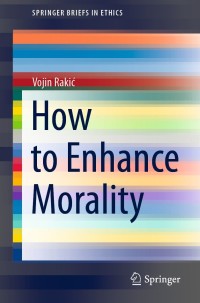Buy How to Enhance Morality PDF ebook by author Vojin Raki? – published by Springer in 2021 and save up to 80% compared to the print version of this textbook. With PDF version of this textbook, not only save you money, you can also highlight, add text, underline add post-it notes, bookmarks to pages, instantly search for the major terms or chapter titles, etc.
You can search our site for other versions of the How to Enhance Morality PDF ebook. You can also search for others PDF ebooks from publisher Springer, as well as from your favorite authors. We have thousands of online textbooks and course materials (mostly in PDF) that you can download immediately after purchase.
Note: e-textBooks do not come with access codes, CDs/DVDs, workbooks, and other supplemental items.
eBook Details:
Full title: How to Enhance Morality
Edition:
Copyright year: 2021
Publisher: Springer
Author: Vojin Raki?
ISBN: 9783030727086, 9780323755825
Format: PDF
Description of How to Enhance Morality:
This book offers an innovative approach to moral enhancement. We, as humans, have a moral duty to be as good as we can be. Hence, moral bio-enhancement (MBE), if effective and safe, is our moral duty. However, it has to be voluntary because if it is made compulsory, human freedom (of the will) would be curtailed. As freedom (of the will) is an essential component of humanness, compulsory MBE would infringe upon our humanness. An essential question is; what will motivate humans to subject themselves voluntarily to MBE?The book argues – and supports by using empirical/experimental evidence – that morality and happiness operate in a circularly supportive relationship that applies to most humans most of the time: the better they are, the happier they will be; the happier they are, the better they will be. Hence, the grounding rationale for MBE ought not to be the prevention of “ultimate harm” based on compulsory MBE (as argued by Persson and Savulescu), but human happiness based on voluntary MBE. The primary objective of the book is to provide the readers with an original view on moral enhancement, whilst proposing a novel conception of moral enhancement that is informed by new biotechnological developments.





